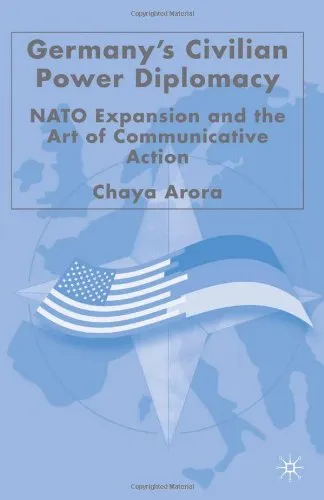Germany's Civilian Power Diplomacy: NATO Expansion and the Art of Communicative Action
4.2
Reviews from our users

You Can Ask your questions from this book's AI after Login
Each download or ask from book AI costs 2 points. To earn more free points, please visit the Points Guide Page and complete some valuable actions.Introduction to 'Germany's Civilian Power Diplomacy: NATO Expansion and the Art of Communicative Action'
In the rapidly evolving geopolitical landscape of the late 20th and early 21st centuries, Germany emerged as a pivotal player, not merely as an economic powerhouse but as a frontrunner in employing civilian power diplomacy. 'Germany's Civilian Power Diplomacy: NATO Expansion and the Art of Communicative Action' delves into Germany's strategic use of soft power and diplomacy within the context of NATO's expansion. This book examines how Germany navigated the complexities of international relations, leveraging its communicative actions while cementing its role in shaping global peace and stability. Through the prism of communicative action theory, this work explores how dialogue and negotiation underpinned Germany's diplomatic ethos.
Detailed Summary of the Book
The book begins by setting the historical and political context of post-Cold War Europe, introducing readers to the concept of 'civilian power' in which Germany acts not just by wielding influence but through fostering multilateral partnerships and advocating for cooperative security arrangements. The narrative unfolds around NATO's expansion eastward, a process fraught with both opportunity and controversy.
The core of the book analyzes Germany's foreign policy strategies that emphasize dialogue, consensus-building, and integration, advocating for diplomacy over military prowess. It thoroughly explores Germany's role in NATO's decision-making process, emphasizing Germany’s efforts to include Eastern European nations in the alliance, thereby ensuring a more comprehensive European security architecture.
Throughout the book, the author presents a nuanced analysis of Germany's strategic objectives, focusing on its pursuit of stability and peace through adherence to ethical norms and international cooperation. The methodology and insights are grounded in the theoretical framework of Jürgen Habermas' communicative action, highlighting the interplay between discourse ethics and diplomatic interactions.
Key Takeaways
- Civilian Power Diplomacy: Understand how Germany's emphasis on communication and cooperation serves as a model for peaceful conflict resolution.
- NATO Expansion: Gain insight into the complexities and strategic imperatives driving NATO's enlargement and Germany’s central role in the process.
- Communicative Action Framework: Explore how Habermasian theory applies to real-world diplomacy, demonstrating the power of dialogue in international relations.
- Strategic Multilateralism: Discover the effectiveness of multilateral alliances in addressing global security challenges within Germany's diplomatic agenda.
Famous Quotes from the Book
"Germany's influence lies not in force, but in its boundless capacity to engage the world in dialogue and foster a shared vision of collective security."
"The art of communicative action, as applied to diplomacy, is about manifesting the common will for peace through persistent dialogue."
Why This Book Matters
This book is crucial for understanding the intricate balance of power, diplomacy, and ethics in modern international relations. It offers an in-depth look at Germany's unique approach to global diplomacy and its impact on NATO expansion, a topic of profound significance for policymakers, scholars, and anyone interested in the future of international peace and stability. By elucidating the principles behind Germany’s diplomatic actions, the book serves as a comprehensive guide to harnessing the power of peaceful dialogue in resolving international conflicts.
The book also contributes significantly to the academic discourse on civilian power by providing an empirical case study that illustrates the practical application of theoretical constructs in contemporary world politics. It remains relevant for its insights into the ongoing challenges and opportunities facing Europe and the global community within the sphere of international diplomacy.
Free Direct Download
Get Free Access to Download this and other Thousands of Books (Join Now)
For read this book you need PDF Reader Software like Foxit Reader
Accessing books through legal platforms and public libraries not only supports the rights of authors and publishers but also contributes to the sustainability of reading culture. Before downloading, please take a moment to consider these options.
Find this book on other platforms:
WorldCat helps you find books in libraries worldwide.
See ratings, reviews, and discussions on Goodreads.
Find and buy rare or used books on AbeBooks.


